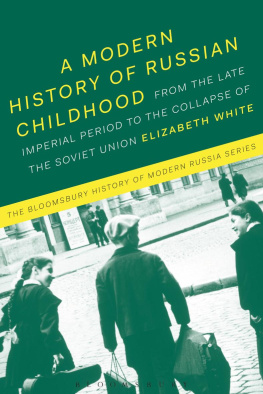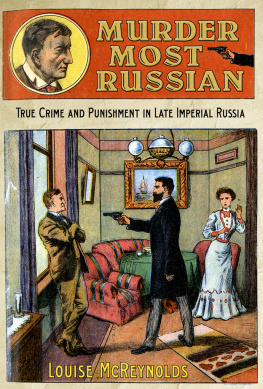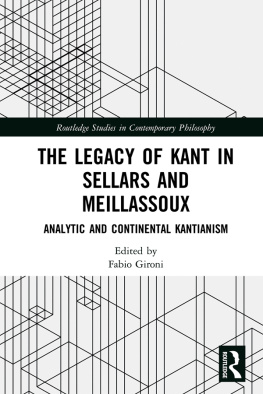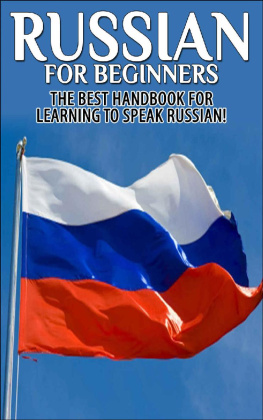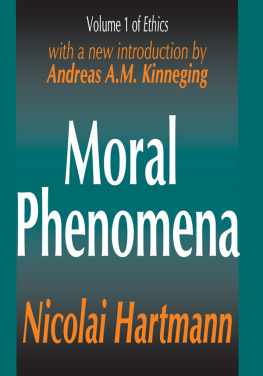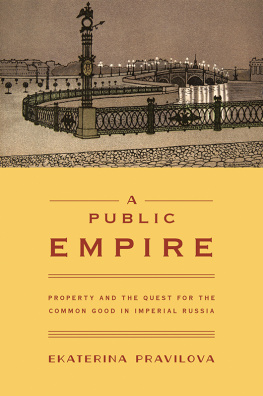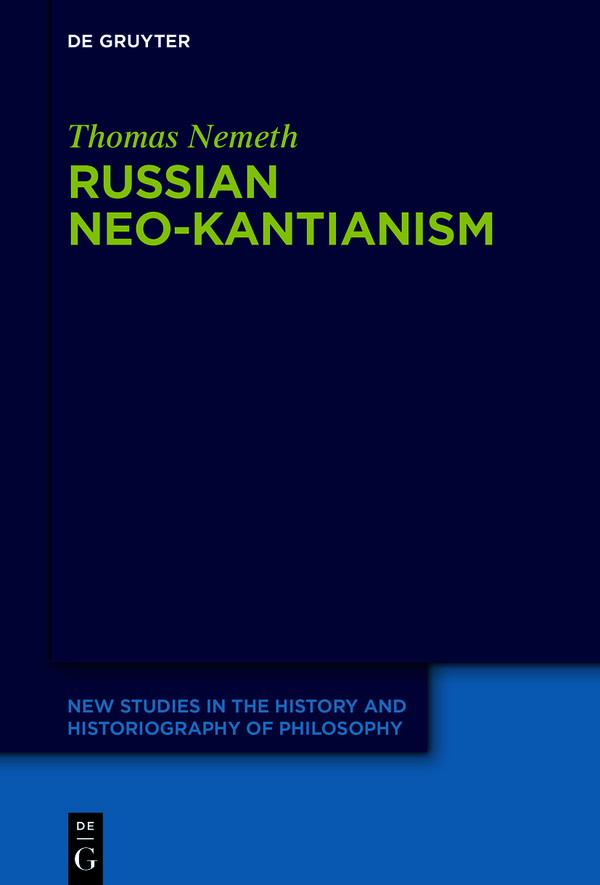New Studies in the History and Historiography of Philosophy
Edited by
Gerald Hartung
Sebastian Luft
Volume
ISBN 9783110755350
e-ISBN (PDF) 9783110755404
e-ISBN (EPUB) 9783110755534
Bibliographic information published by the Deutsche Nationalbibliothek
The Deutsche Nationalbibliothek lists this publication in the Deutsche Nationalbibliografie; detailed bibliographic data are available on the Internet at http://dnb.dnb.de.
2022 Walter de Gruyter GmbH, Berlin/Boston
Man muss den Begriff ,Neukantianismus nicht substanziell,
sondern funktionell bestimmen. Es handelt sich nicht um
eine Art der Philosophie als dogmatisches Lehrsystem,
sondern um eine Richtung der Fragestellung.
Ernst Cassirer
Introduction
In a previous study, this author focused on the reaction to Kants philosophy its interpretation and criticism by a host of figures during the late Imperial Russian era. My concern here is with the philosophical ideas of the generally young philosophers who broadly and explicitly accepted what they took to be the meaning of Kants thought, but found it needed updating, modification, or completion in some respect without departing from what each took to be the spirit of that thought. This, as a sweeping generalization, was and is the essence of neo-Kantianism regardless of the particular direction each school took. Some pivoted their constructions on a realization that Kant had based his philosophy on the natural sciences of the day, primarily Newtonian mechanics. They saw their task in the wake of the first Critique to be a reexamination and reassessment of Kants work based on the current state of natural science, while employing what they took to be his essential methodology. Of course, a divergence in opinion as to just what that essential methodology was immediately came to the fore. Others believed that Kant had not addressed all possible fields of scientific study, notably the rise and development of the social sciences. And again, of course, differences arose not simply with regard to the approach to be taken toward the social sciences but also over which social science should be taken as paradigmatic. These philosophers largely had no quarrel with Kants treatment of the physics of his day, but for them, the task awaiting contemporary philosophy was to extend Kants proclaimed transcendental methodology, in their understanding of it, to the newly emerging fields. They saw that the key to their endeavor could be found in Kants second and third Critiques rather than the Critique of Pure Reason, though they certainly appreciated the latter too.
As with the study of any intellectual movement in history, let alone a philosophical one, a more precise definition of neo-Kantianism, both in terms of its central ideas and of its proponents or sympathizers, though a desideratum, presents a daunting challenge if it is even possible. And as with many historical trends, attitudes, eras, and, yes, movements, the more we attempt to confine them within a definition the more they appear to slip from our grasp. Taken as a historical phenomenon, it is virtually inevitable that controversies will eventually erupt between scholars concerning what the movement upheld, who its protagonists and antagonists were, and what those individuals saw as the movements proper tasks. In a study such as this, some, undoubtedly, would argue that the ground to be explored must first be delimited lest the resulting investigation embrace so many figures and ideas that the central ones, those most instrumental in shaping the movement, be eclipsed or smothered by those on the periphery, those who contributed little or even nothing to the movements dynamic nature. It is possible, on the other hand, that a precise delimitation at the start will unduly narrow our understanding of the movement in such a way that we risk losing sight of its fluidity and of the vitality of the ideas promoted within it.
As a case in point, German neo-Kantianism consisted of more than two branches, even though only two exhibited some cohesion across more than a single generation. Thus, they understandably have drawn the lions share of attention from intellectual historians, who gravitate toward the transmission of ideas rather than their veracity. The first of these branches or directions within neo-Kantianism was promulgated predominantly by two philosophy professors, Hermann Cohen and Paul Natorp, in the university town of Marburg and is generally referred to as the Marburg School. There were others who intellectually were part of this direction, foremost among them being Ernst Cassirer, even though he never taught in Marburg. However, Cassirer rose to prominence within the neo-Kantian movement only when the Russian neo-Kantian movement was well underway. For many of the Russians, he was a diligent and committed fellow traveler along the neo-Kantian road rather than a teacher, but there is no evidence that they looked upon him with awe or toward him for inspiration. Cassirers early writings on the history of modern philosophy, with their emphasis on the theory of cognition, amazingly received at most scant recognition, itself a telling sign regarding the concerns of those within Russia. We should point out that most young philosophy students from Imperial Russia who went for further instruction to Marburg went there specifically to hear Cohen, though not necessarily to learn about his interpretation of Kant. Cohen had a certain renown in Russia for his treatment of Plato. Although Natorps reading of Plato is better known today than Cohens, it attracted less attention in Russia. The philosophical audience there valued Natorp as a teacher and a promoter of the Marburg School agenda, but none from Russia went to Marburg specifically to study with him. We find this reflected in the Russian secondary literature, in which Cohens ideas are discussed with hardly a mention of Natorps. We should also not discount the role of the respective personalities in the transmission of ideas. Even from afar, Cohens enthusiasm and proselytizing on behalf of his reading of Kant seeped into Moscow and St. Petersburg, becoming a small but steady stream. Nor should we forget that his unabashed and unapologetic Judaism drew attention and amazement from young Jews, whether observant or not, in Russia familiar with career restrictions, if not outright discrimination, in their home country.
The other major branch of German neo-Kantianism is largely associated with what then was the state of Baden in south-west Germany. Whereas the Marburg philosophers demonstrated a marked concern for reflection on the natural sciences of the day, particularly physics, the Baden philosophers, primarily Wilhelm Windelband and Heinrich Rickert, focused attention more directly on the methodology of the social sciences and on the role of values within the theory of cognition. These concerns, rather than those associated with Cohen and Natorp, were more closely attuned to the traditional interests of Russian thought, and as a result, many promising students from Imperial Russia flocked to the Baden universities and initially adhered more closely to the overall framework of Baden neo-Kantianism than did those who went to Marburg. But by the same token, their commitment to it was less firm. With fewer canonical and systematic texts to look to for inspiration and guidance, those Russians who studied with the Baden philosophers often drifted away sooner from philosophy than those who studied in Marburg.
If we were to restrict ourselves to the philosophers associated with just these two German schools of neo-Kantianism, thereby omitting such figures as, for example, Leonard Nelson and Alois Riehl, we would have a greatly diminished and far less varied conception of the German neo-Kantian movement than was the case and one that all agree dominated German academic philosophy during the Wilhelmian era. But neo-Kantianism was the dominant philosophical movement in German academia for some fifty years and not just at two universities. Although Riehl was certainly well-known within the countrys higher educational institutions at the time and his works were read both domestically as well as internationally, neither he nor Nelson created a separate neo-Kantian school. Yet both Riehl and Nelson held distinctive positions within the movement that make them stand apart from the others and, of course, from one another. No history of German neo-Kantianism could afford to do without some discussion of their ideas and of the active role each played in the events, squabbles, and disputes of the time. Nevertheless, Nelson will not appear in the pages that follow. His work, apart from a single long essay that appeared in 1913 in translation, was largely unknown to the Russian philosophical audience, which in any case would have reacted in horror to what they surely would have understood as support for a psychologized neo-Kantianism. The young Russian neo-Kantians were unanimous in opposition to psychologism.


